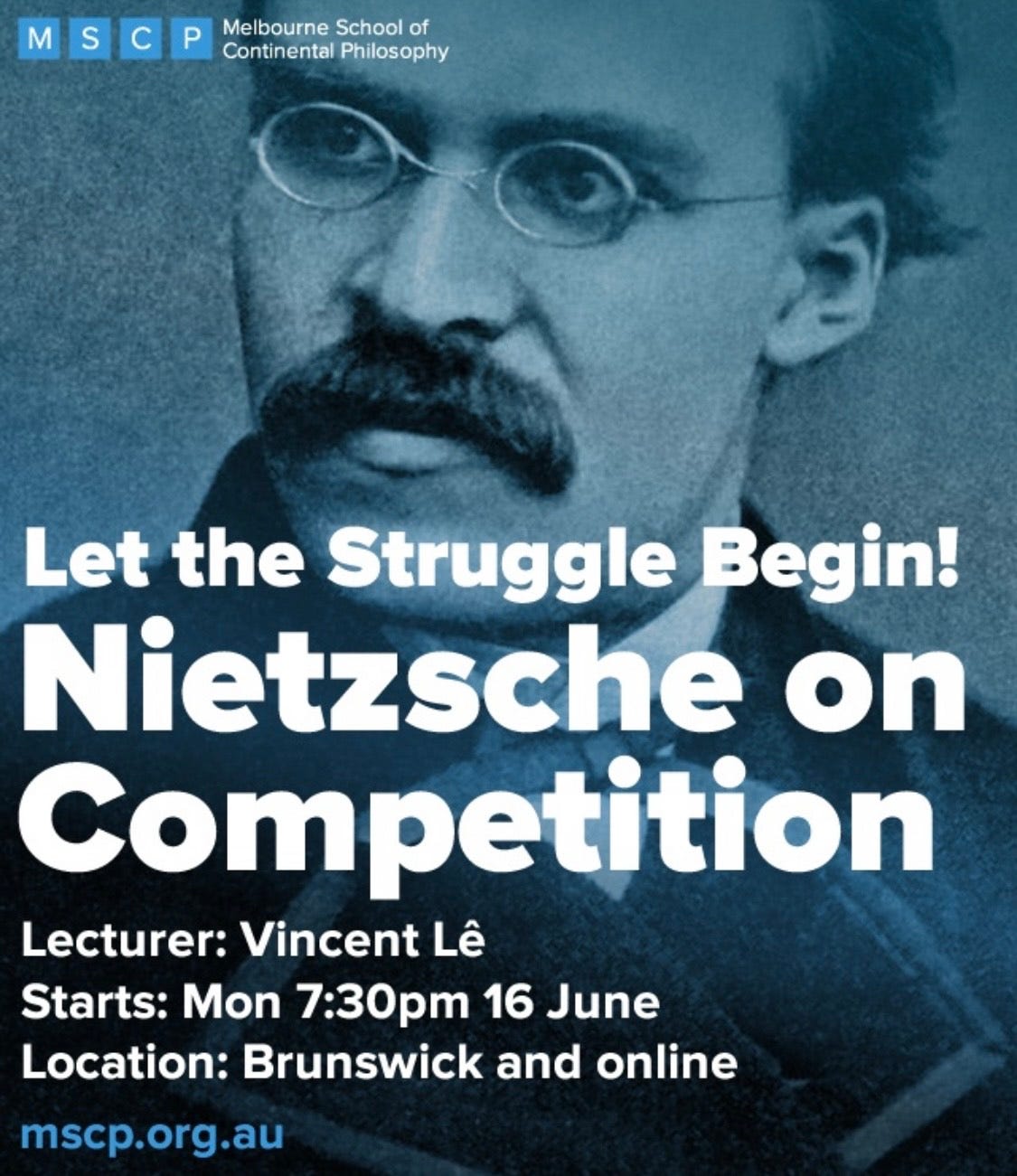Let the Struggle Begin! Nietzsche on Competition
Upcoming course at the Melbourne School of Continental Philosophy
Enrol at https://www.mscp.org.au/courses/winter-school-2025
Starts: Mon 7:30-9:30pm 16 Jun
Full Schedule: June 16-14 July
Location: Brunswick and online via Zoom. All lectures are also recorded.
This course looks at Nietzsche’s writings on the Greek agon, experimental science, natural selection, and other competitive selection processes, which he conceives as a kind of epistemology enabling agents to maximize their power. According to this competitive epistemology, agents may calculate whether a real improvement in their intelligence, creativity, and resourcefulness has been achieved through trial-and-error selection processes by means of which they demonstrably prove themselves to excel more than other rival agents.
Week 1. Perspectivism
The first week addresses a popular scholarly interpretation of Nietzsche’s writings on language as leading to his doctrine of “perspectivism” whereby all truths are relative to different communities’ collective rules, social standards, and linguistic uses for what counts as true. We shall see that this line of interpretation ultimately struggles to fully account for how Nietzsche can also make frequent value judgments about some agents being better than others through his many rank orderings between higher and lower types, ascending and descending forms of life, master and slave moralities, and so on.
Suggested readings:
Friedrich Nietzsche, “On Truth and Lying in a Non-Moral Sense,” in The Birth of Tragedy and Other Writings, eds. Raymond Geuss and Ronald Speirs, trans. Ronald Speirs (Cambridge: Cambridge University Press, 2007), 139-153.
Alexander Nehamas, “Introduction,” in Nietzsche: Life as Literature (London: Harvard University Press, 1985), 1-4.
Arthur C. Danto, “Perspectivism,” in Nietzsche as Philosopher: Expanded Edition (New York: Columbia University Press, 2005), 54-81.
Weeks 2-4.
Particularly drawing inspiration from his neglected 1873 essay “Homer’s Contest,” the vast bulk of the course explores the hypothesis that Nietzsche may only reject the idea that language using agents can arrive at objective truths through rational discussion in favor of establishing a legitimate order of rank by getting agents to compete, with those emerging victorious demonstrably proving in practice to be the most intelligent, creative, and resourceful. In the second to fourth weeks, we will reconstruct this agonistic method for determining genuine enhancements of power by looking at three main contrasts in Nietzsche’s early, middle, and late period works.
Week 2. Competition in the Early Period Works: The Greek Agon contra Rationalism
Suggested readings:
Friedrich Nietzsche, “Homer’s Contest,” in Nietzscheana 5, ed. and trans. Christa Davis Acampora (Urbana: North American Nietzsche Society, 1996), 1-8.
Yunus Tuncel, “The Mythic Context of the Agon,” in Agon in Nietzsche (Milwaukee: Marquette University Press, 2013), 19-41.
Week 3. Competition in the Middle Period Works: Modern Experimental Science contra Social Democracy
Suggested readings:
Friedrich Nietzsche, The Complete Works of Friedrich Nietzsche 3: Human, All Too Human, I: A Book for Free Spirits, eds. Alan D. Schrift, Duncan Large, and Adrian Del Caro, trans. Gary Handwerk (Stanford: Stanford University Press, 1995), sections 7 (preface), 164, 224, 235, 237, 242, 634-5.
Week 4. Competition in the Late Period Works: Natural Selection contra Christianity
Suggested readings:
Neil Durrant, “A Naturalist Alternative,” in Nietzsche’s Renewal of Ancient Ethics: Friendship as Contest (London: Bloomsbury, 2023), 53-71.
Friedrich Nietzsche, “‘Good and Evil,’ ‘Good and Bad,’” in On the Genealogy of Morals: A Polemic, in The Complete Works of Friedrich Nietzsche 8: Beyond Good and Evil / On the Genealogy of Morals, eds. Alan D. Schrift, Duncan Large, and Adrian Del Caro, trans. Adrian Del Caro (Stanford: Stanford University Press, 2014), 217-245.
Week 5. Loose Ends
The final week responds to a possible objection to competitive epistemology: Nietzsche sometimes says that the weak types have paradoxically prevailed over the strong types. We will see how he qualifies that the weak types can only do so either by teaming up to become collectively stronger than any one individual strong type or by individual weak types cultivating enough power to overthrow the once strong types who grow idle and complacent due to their monopoly rule. We will then conclude by looking at certain parallels between Nietzsche’s understanding of intelligence and creativity as multi-agent collective systems and contemporary cognitive science theories of extended mind.
Suggested readings:
Andy Clark and David Chalmers, “The Extended Mind,” Analysis 58, no. 1 (1998): 7-19.
Christa Davis Acampora, “Nietzsche and Embodied Cognition,” in Nietzsche on Consciousness and the Embodied Mind, ed. Manuel Dries (Berlin: Walter de Gruyter GmbH, 2018), 17-47.



Thanks for sharing. Though I could never make these class times (being on the west coast of the US), it is interesting to look at the recommended reading.